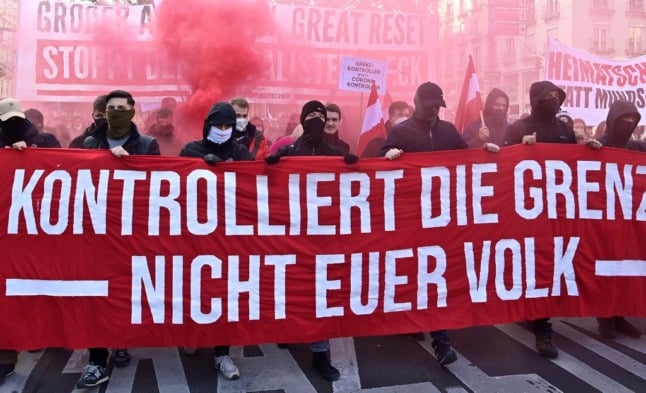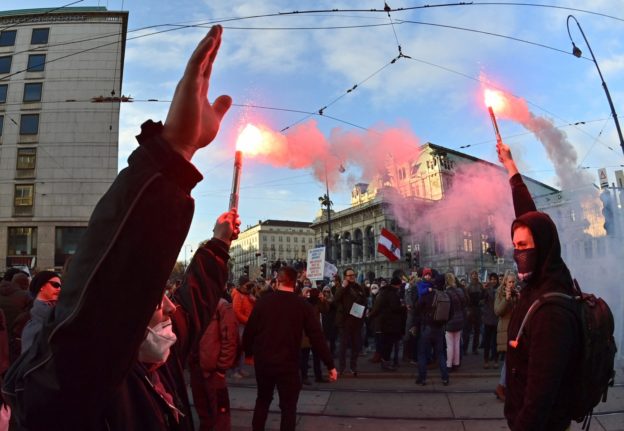Austria’s interior ministry on Monday warned of a “noticeable influx” in the country’s extreme right scene, announcing it arrested two men in separate cases – one for allegedly being involved in an international white supremacist group and another for allegedly subscribing to Nazi ideology.
“The so-called ‘New Right’ currently represents the greatest challenge in the area of right-wing extremism,” Austria’s interior ministry said in a statement, naming the Identitarian Movement as part of this grouping.
There is currently a noticeable influx into the scene, although exact numbers are difficult to determine,” it added.
How big is the movement?
It’s difficult to assess, as Austrian authorities admitted. However, the group – and other far-right groups, have been growing.
The “New Right” “are taking advantage of all the crises of the past few years… to strengthen their structure and propaganda,” Austria’s interior ministry stated, citing the Covid pandemic, Russia’s invasion of Ukraine and inflation.
Not unlike other far-right groups, the ‘Identitäre Bewegung’ Österreich (IBÖ) uses scapegoats to blame Austria’s sorrows. This time, migrants and non-Europeans (especially from Arab or Muslim countries), as well as any political group, allow for unchecked migration to happen.
READ ALSO: What measures against foreigners is Austria’s far-right trying to take?
Are they dangerous?
Many of their demonstrations are not (physically) violent, and the group itself repeats that it is pro-democracy. However, the group’s ideas, with former co-leader Martin Sellner recently meeting with German far-right members to defend his “remigration” ideas of mass deportations of “migrants who are not assimilated or who culturally, economically and criminally weigh on society”, are certainly not peaceful.
Raids targeting far-right people are also not rare and often end up with several guns and Nazi memorabilia apprehended, as The Local continuously reports.
Austria’s Interior Ministry also noted the “New Right’s “high affinity for weapons and cited past incidents of “violent tendencies, riots and attacks on the police”.
READ ALSO: UPDATE: Why is support for Austria’s far-right FPÖ rising?
What are the origins of the Identitarian Movement in Austria?
The ‘Identitäre Bewegung’ Österreich (IBÖ) is the Austrian branch of the pan-European Identitarian movement. Originating in France with ‘Generation Identitaire’, the movement takes its lead from several ‘New Right’ thinkers, such as Alain de Benoist, who rejected the progressive changes throughout Europe over the past twenty years. Instead, they advocate a range of nativist and traditionalist ideas.
The movement likes to concern itself with the idea of a specific national heritage and way of life under threat, especially by “unchecked migration”, particularly of the Islamic variety. However, they also rail against what they deem ‘cultural Marxism’ – the degeneration of society perpetrated by academics and other ‘establishment’ figures.
The Austrian arm was founded in 2012 by several members of the far-right scene, most notably Martin Sellner, the group’s face. It started organising protests against asylum policies in Austria and has since been investigated for spreading radical, xenophobic and Islamophobic ideology.
READ ALSO: Austria’s far-right aims to suspend granting of citizenship to ‘non-Europeans’
The group and its leader made international headlines when it was revealed that the perpetrator of the 2019 Christchurch mosque shootings that left 51 dead had exchanged friendly emails with Sellner, who denied ever meeting the white supremacist in person or knowing of his plans.
Sellner has also been linked to the far-right and neo-nazi scene from an early age. In 2006, when he was 17, he admitted to placing stickers with a swastika and other Nazi symbols on a synagogue in Lower Austria.
READ ALSO: In Austria, Russia far-right sect tries to get a foothold in Europe

He later said he had “broken” with neo-nazi ideas, and the group “affirms their democracy”. The IBÖ continued and increased its demonstrations against Muslim people and refugees, often trying to link refugees to terrorist attacks in Europe, reiterating their belief that refugees are a “threat” to Europe’’ security.
READ ALSO: ‘Inhuman speech’: Austria’s far-right blasted for wanting to tie social benefits to German skills
We’re “zero percent racism and 100 percent identity,” Sellner said in a 2016 interview where he defended “ethno-pluralism”, that “other” cultures and religions are acceptable as long as they stay in their own countries.
In that line, the group also subscribes to the conspiracist (and rooted in Nazi speeches) narrative of “the great replacement”, stating that the “native” European population would soon be replaced by the growing community of (primarily people of colour and predominantly Muslim) immigrants.
Austria’s far-right party, FPÖ, has largely broadcast these ideas, which have grown in polls with anti-asylum ideals.



 Please whitelist us to continue reading.
Please whitelist us to continue reading.
Member comments